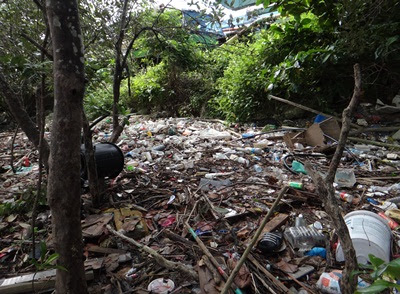Here's a chance for you to take the lead on marine litter. International Coastal Cleanup Singapore is looking for volunteer coordinators for this year's clean up.
Sign up and make a difference for awful situations. Like this one that I saw at Kranji today.
I saw all kinds of interesting plants and animals on this narrow stretch of mangroves at Kranji. Alas, there was also lots of rubbish on the high shores.
I got the sense that some parts of the shore had lots more rubbish than other parts. Do some industrial tenants simply dump their trash over their fence? While other tenants are more responsible?
A particularly bad patch behind some huge dump trucks.
I even saw a printer (the black box) and a mattress. These didn't float up to the high shore for sure.
Another look at the bad stretch.
Many of the mangrove trees were festooned with plastic of all colours and sizes.
Most of the plastic seem to be plastic bags used for carrying food.
The pile of orange stuff that I saw on my last trip here two years ago seems to have moved up the shore. Or is it a new pile of orange stuff?
Some parts of the shore was less badly rubbished.
Fortunately, the litter doesn't seem to stretch down all the way to the mangrove trees.
International Coastal Cleanup Singapore (ICCS) is NOT just about picking up rubbish. It is about educating people and collecting data about the litter on our shores. ICCS involves thousands of people. It is the single most important event in the year to raise awareness about marine litter. All the shores are targeted. From mangroves to recreational beaches. Remote shore to accessible shores.
If you have strong organisational skills, some time to set aside to work with the rest of the well trained coordinating team, you CAN make a huge difference in dealing with the trashy issue. Sign up to be on the coordinating team.
As Siva says "ICCS participants learn the issues affecting our seas first hand and experienced Organisers take it further - they educate participants about marine life of Singapore, impacts to our oceans, examine the national and international data and grapple with the curse of single-use consumer plastic. They consider how to reduce use and disposal for recycling. Action in daily life is a powerful avenue to lead to larger scale solutions."











